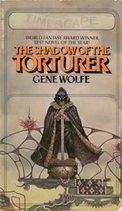
| Series: | New Sun #1 |
| Publisher: | |
| Copyright: | 1980 |
| Printing: | May 1981 |
| ISBN: | 0-671-45070-0 |
| Format: | Mass market |
| Pages: | 262 |
This is the first book of the four-volume Book of the New Sun series. I had read it long ago (about ten years ago now), and for some reason had not continued on to the other books, so I re-read it in preparation for reading the rest of the series.
This is another excellent use of first-person narration. The reader is slowly immersed in the world through the eyes of a member of the long-standing and despised torturer's guild, a sheltered and closed life that serves as a springboard to slowly introduce the richness and depth of the world. The narrator is reflective and deeply thoughtful, giving the story a strong feeling of having been written far later in life, fumbling to find the best storytelling style, looking back on the events and struggling to put them into context. I liked the effect quite a lot, and it helped me to get into the head of the character.
This is the book that I was hoping Jack Vance's The Dying Earth would be, and is rather more deserving of the name than that book was. Everywhere you turn, you can feel the accumulated weight of millenia of civilization. The city is full of ancient towers and even more ancient traditions and history piles with a weight that the characters struggle with. The slow death of the sun is both less talked-about and more ever-present; the characters comment on the stars and the reader realizes it's still day, or a character notes that the blue of a ceiling is so much brighter and richer than the dark blue of the sky, and the reader is treated to an ongoing series of jolts that emphasize the otherness and difference.
In support of that sense of age, Wolfe's use of many obsolete, unusual, and archaic words is masterfully done. They're used lightly enough that I wasn't constantly reaching for a dictionary just to understand the story, but at the same time frequently enough to give a feel of complexity and richness to the narrative and add an aura of foreignness to the roles and objects we see. Using the term destrier instead of horse, for example, let me still understand immediately what was meant, but at the same time made me pause and realize that this probably isn't exactly a horse. I can imagine the train wreck that would result if a lesser author attempted this technique, but Wolfe strikes just the right balance.
I'm very tempted to re-read this book at some point with a dictionary close by, looking up every unusual word that Wolfe uses just to appreciate the appropriateness and inventiveness with which he chose his terms.
If the book has a weak spot, it's that the plot is somewhat iffy despite the very strong characterization. Things happen, but there is occasionally not that much coherence to their pace, and the book wanders a bit afield in the middle while the characters are wandering the garden. Even those portions remain a marvelous exploration of a fascinating world, but I think I would have enjoyed this story a bit more if it had been a bit tighter.
I'll also warn that this book does not even attempt to form an independent ending. If you finish it and don't have The Claw of the Conciliator handy to open immediately to replace it, you'll be annoyed.
This is an excellent book, and well deserves it's place as a classic of fantasy.
Followed by The Claw of the Conciliator.
Reviewed: 2004-06-14